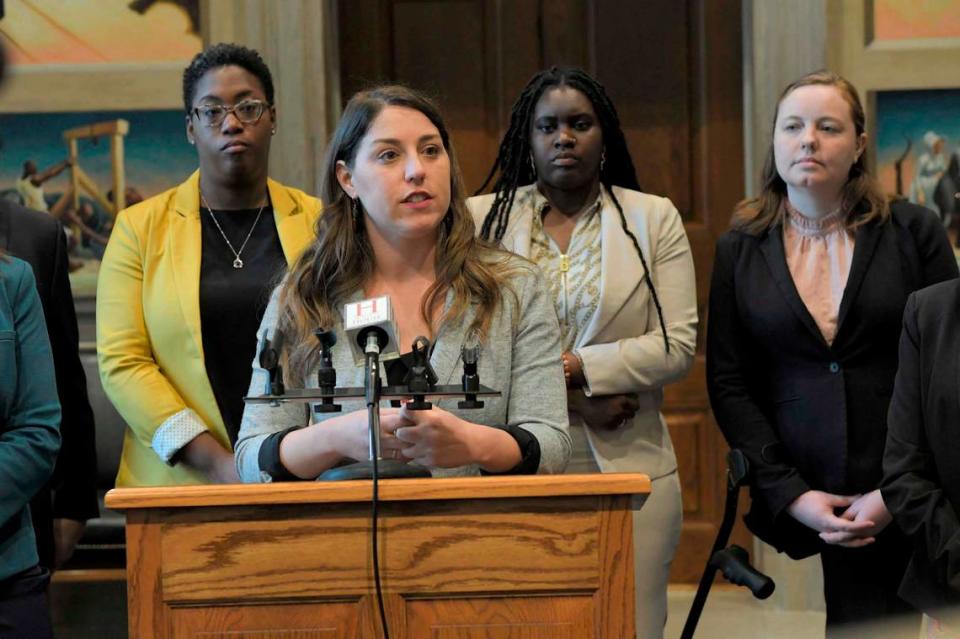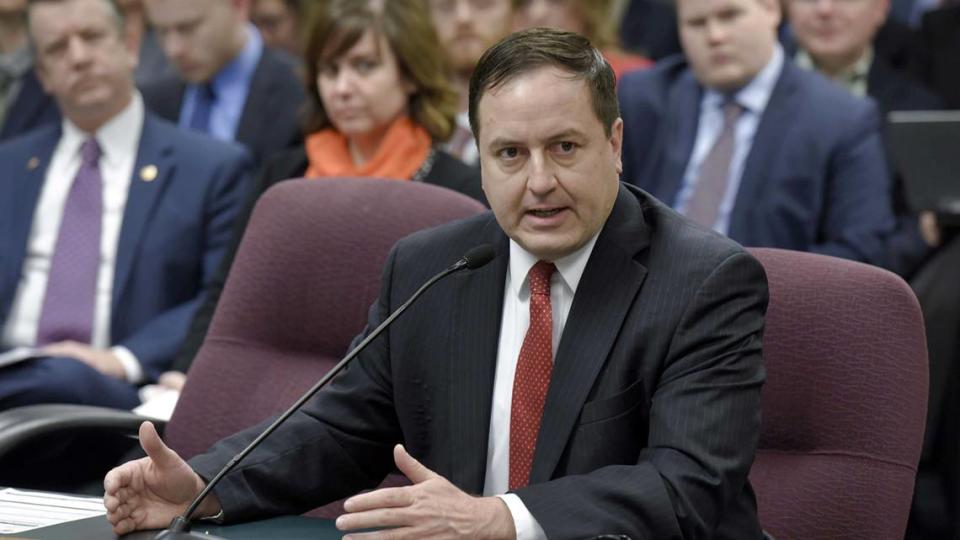‘We had no money.’ In MO governor’s race, candidates highlight their childhood challenges
- Oops!Something went wrong.Please try again later.
- Oops!Something went wrong.Please try again later.
- Oops!Something went wrong.Please try again later.
- Oops!Something went wrong.Please try again later.
- Oops!Something went wrong.Please try again later.
After Missouri House Minority Leader Crystal Quade launched her Democratic campaign for governor this week by emphasizing a humble early life that included becoming the first person in her family to graduate high school, Republican Lt. Gov. Mike Kehoe took to social media to highlight his own upbringing by a single mom with six children.
Quade’s entry into the 2024 race for governor has for the moment placed the candidates’ childhood and youth at the center of the contest – and spurred a fight over what lessons Missourians should take from their by-the-bootstraps narratives.
As Quade and Kehoe, a candidate for more than a year, seek to make an impression among donors and voters, they are also contrasting their origin stories with the other major GOP candidate, state Secretary of State Jay Ashcroft, son of John Ashcroft, a former governor, senator and U.S. attorney general.
“We had no money. I didn’t make excuses. My siblings and I had to work hard to support my mom and we earned the opportunity to achieve the American Dream,” Kehoe wrote on Twitter after Quade’s launch.
Kehoe, 61, was born and raised in North St. Louis. He has said that he never met his father and began working at age 15 washing cars at a Ford dealership and worked his way into sales management by his early 20s, and that his mother worked three jobs.
Kehoe went on to own a prominent car dealership in Jefferson City before his election to the Missouri Senate in 2010. He also has a beef cattle production business on a family farm in Phelps and Pulaski counties, according to an official biography. When Quade launched her campaign, the Springfield Democrat noted that “I don’t own a car dealership, or a cattle farm.”
Quade, 37, said at her formal announcement at a Springfield coffee shop on Monday that she had grown up in similar cafes as her mother worked double and triple shifts as a waitress. She said that after her mom met her stepfather, they moved to Webster County and that his factory job offered stability that allowed her to become the first in the family to graduate high school.
Quade, who was first elected to the Missouri House in 2016, described working as a server across Springfield to pay her way through Missouri State University. “I’m running for governor so that people working extra shifts today can make life better for their kids tomorrow,” she said.
Missouri Democrats in recent years have struggled to win statewide elections, with former President Donald Trump supercharging the state’s decades-long drift toward Republicans. The last Democrat to win a statewide election, former Auditor Nicole Galloway in 2018, lost the 2020 race for governor to Gov. Mike Parson by 16 percentage points.
But Quade is running after the U.S. Supreme Court ended the federal right to abortion and Missouri became the first state in the country to impose a near-total ban following the decision. Abortion bans have proven unpopular with voters nationally and the issue helped buoy Democrats in midterm congressional elections last year.
“The whole idea … is just to say, ‘Look, I’m one of you, but like you, I’ve made something of myself,” Daniel Ponder, a political science professor at Drury University in Springfield, said of Quade and Kehoe’s early life narratives.

Conflicting lessons from upbringings
While Quade and Kehoe have both talked about facing challenges early in life, the candidates are promoting very different campaign messages based on them.
In a statement, Kehoe campaign spokesman Michael Hafner said the lieutenant governor is thankful to live in a country “where someone like him could go on to own a business and even create jobs for others to provide for their families.”
“Those experiences have defined Mike Kehoe’s character,” Hafner said. “The progressive Left presents a vision of the American dream that relies on entitlements and government handouts, rather than opportunities for hand-ups.”
Quade this week said she was running a campaign on “pocketbook issues,” focusing on strengthening public schools, making health care more affordable and expanding child care across the state. Her opponents, she said, want to give tax cuts to corporations and wealthy individuals while “the rest of us are figuring out how to pay for things that are too expensive.”
Missouri ranks at the bottom in too many categories, from teacher pay and maternal mortality to state worker pay, Quade said.
“Unfortunately, my opponents in the Republican legislature have no interest in campaigning on those issues,” she said. “They have one playbook, a relentless full scale attack on our rights and our freedoms. They seek to divide us at every turn.”
Offering a potential window into how Republicans will combat Quade, James Harris, a Jefferson City-based Republican consultant, said she was attempting a kind of class warfare but that Kehoe was demonstrating how he achieved the American dream.
“I think the difference, though, with Gov. Kehoe and Crystal Quade, is Gov. Kehoe, through his own work, believes the best day is when someone earns their first paycheck. And Crystal Quade believes that the best day is when they cash a welfare check,” Harris said.
But Geoff Gerling, a former executive director of the Jackson County Democratic Committee, said Quade’s view – and the view of the larger Democratic Party – is that government works best when it allows people opportunities to succeed for themselves and for future generations.
Republicans, he said, would rather punish what they view as failure and reward those who are already successful.
“No party has a monopoly on coming up from humble beginnings. It doesn’t matter. It’s how you got there and how you want to legislate once you have become a successful politician or policymaker based on your experiences,” Gerling said.
Contrast with Ashcroft
Despite their differences, both Quade and Kehoe have sought to distinguish themselves from Ashcroft.
Quade said in Springfield that “my daddy wasn’t a U.S. senator or governor” and Kehoe campaign manager Derek Coats said in a statement on Wednesday that the lieutenant governor became a successful small businessman “without a famous last name.”
Ashcroft, 50, was an engineer and taught engineering and technology courses at Saint Louis Community College before earning a law degree from Saint Louis University in 2008. An official biography says he worked with his father in the Ashcroft Law Firm, specializing in helping businesses comply with federal regulations.
Ashcroft was elected state secretary of state in 2016 and re-elected in 2020.
“I’m grateful for a family history of public service, but while others are focused on the past, I am focused on the future of Missouri. On creating educational freedom for families, reducing red tape on businesses and fighting rising crime,” Ashcroft said in a statement.

Harris said that while the Ashcroft name is known around the state, he has a “good story of his own” and has been an outspoken conservative. He suggested Ashcroft doesn’t need to respond to the criticism of his family history, saying that typically if a candidate is responding they are losing.
“I think anyone that knows the Ashcroft family, they’re frugal people. They don’t drive fancy vehicles, they don’t dress, act lavish and you know, they’re very frugal,” Harris said. “So, if I was him, I would just talk about my vision for the future of the state.”
In a brief interview with The Star in January, John Ashcroft said his son would be a “profoundly valuable asset to the state” if elected governor.
“You know, I also was chairman of the National Governors Association and I’ve seen and worked with a lot of governors. He certainly has the character and capacity and the industry to do it. I’ve never seen anybody work as hard in state government as he does,” Ashcroft said.
Gerling said if he were advising Secretary Ashcroft, he would tell the Republican to “keep your mouth shut” on the issue of his family history and continue trying to outflank Kehoe on the right.
“I would anticipate this next year the Secretary of State’s Office becoming more and more political and that’s his answer to it,” Gerling said.
Over the past year Ashcroft has made several moves to attract attention from conservatives, including putting forward a rule prohibiting public library employees from giving minors access to materials without first receiving parental permission. He has also pulled Missouri out of a national system designed to improve the accuracy of voting rolls as conspiracy theories in conservative circles fuel fears related to any perceived centralized control of elections.
Very little public polling has been released in the race. In a poll of 706 likely Republican voters conducted last week by Remington Research, a firm that works with GOP candidates, for the political news service Missouri Scout, Ashcroft had 34% support to 14% for Kehoe. State Sen. Bill Eigel, a Weldon Spring Republican who has been running an exploratory campaign, was at 4%. The poll had a margin of error of plus or minus 3.4%.
In the poll, a full 48% of likely GOP voters remain undecided.

